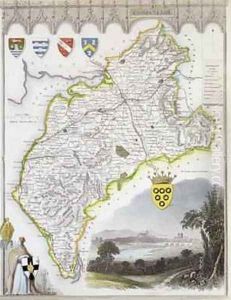Thomas Moule Paintings
Thomas Moule was an English antiquarian, writer, publisher, and topographer, best known for his work in the field of cartography. Born in 1784 in London, England, Moule had a diverse career that extended beyond mapmaking. He was also a bookseller and a literary man who had a deep interest in British history and topography.
In his early years, Moule was apprenticed to a bookseller, which gave him a solid grounding in the literary and publishing world. He became a partner in a bookselling firm in Grosvenor Square, and later, he held the position of Inspector of 'blind' letters in the General Post Office, a role he maintained until his death.
Moule's passion for history and topography led him to produce a number of works on these subjects. He authored books such as 'Bibliotheca Heraldica Magnae Britanniae' and contributed to periodicals of the time. However, what truly distinguished him was his contribution to cartography.
Thomas Moule is best remembered for his county maps of England, which he began publishing in 1830. These maps were highly detailed and featured a unique, ornate style that was very different from the more austere and scientific maps of the period. His maps included elaborate vignettes of local landmarks, figures in period costumes, and heraldic shields. These embellishments reflected Moule's antiquarian interests and his intent to celebrate Britain's history and heritage.
Moule's maps were published in a series of parts and were later collected into 'The English Counties Delineated,' a comprehensive atlas that was popular in Victorian households. Despite the artistic appeal of Moule's maps, they were not regarded as the most accurate for navigation or detailed topographical studies, but they were much admired for their decorative qualities and as a reflection of Victorian England's taste and culture.
Thomas Moule's maps also had a significant cultural impact, as they contributed to the Victorian public's interest in local history and topography. His work coincided with a period of growing national pride and interest in Britain's past, aligning well with the sensibilities of his contemporaries.
Moule's contributions to cartography and his distinctive style have ensured that his maps remain collectible items and are appreciated for their historical and artistic value. He died in 1851, but his legacy as a mapmaker and his influence on the visual culture of his time continue to be recognized by historians and collectors alike.
